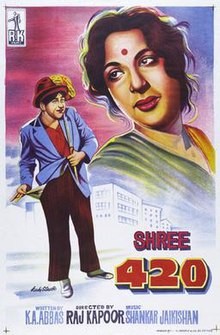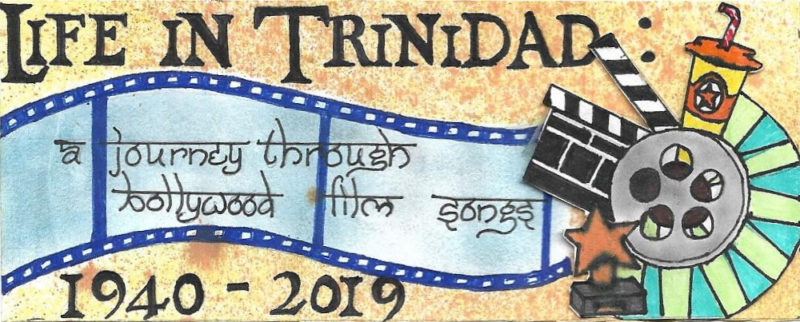Mera Joota Hai Japani
| Song Title | Mera Joota Hai Japani |
| Movie Title | Shree 420 |
| Date Released (India) | September 6, 1955 |
| Date Released (Trinidad) | Unknown |
| Singer | Mukesh |
| Lyricist | Shailendra |
| Composer | Shankar Jaikishan |
| Starring | Nargis, Nadira, and Raj Kapoor |
Music video of Mera Joota Hai Japani from the movie Shree 420.
Song Lyrics
| Mukesh | Mukesh |
| Mera joota hai japani Yeh patloon englistani Sar pe laal topi rusi Phir bhi dil hai hindustani | My shoes are Japanese These trousers are English The red cap on my head is Russian But still my heart is Indian |
| Mera joota hai japani Yeh patloon englistani Sar pe laal topi rusi Phir bhi dil hai hindustani Mera joota hai japani | My shoes are Japanese These trousers are English The red cap on my head is Russian But still my heart is Indian My shoes are Japanese |
| Nikal pade hai khuli sadak par Apna seena taane Apna seena taane Manzil kahan, kahan rukna hai Upar waala jaane Upar waala jaane Badhte jaaye hum sailani Jaise ek dariya toofani Sar pe laal topi rusi Phir bhi dil hai Hindustani | I venture out into the wide, open road I walk with my head held high I walk with my head held high Where does my destination lie? Where will I settle? Only God knows Only God knows I’ll forge ahead relentlessly Like a fast-flowing river The red cap on my head is Russian But still my heart is Indian |
| Mera joota hai japani Yeh patloon englistani Sar pe laal topi rusi Phir bhi dil hai hindustani Mera joota hai japani | My shoes are Japanese These trousers are English The red cap on my head is Russian But still my heart is Indian My shoes are Japanese |
| Upar neeche neeche upar Lehar chale jeevan ki Lehar chale jeevan ki Nadaan hai joh baith kinare Pooche raah watan ki Pooche raah watan ki Chalna jeevan ki kahani Rukna maut ki nishani Sar pe laal topi rusi Phir bhi dil hai Hindustani | Up and down, down and up The waves of life flow The waves of life flow Foolish are those who sit on the sidelines With little care for their country With little care for their country Forging ahead is like life Stopping is a sign of death The red cap on my head is Russian But still my heart is Indian |
| Mera joota hai japani Yeh patloon englistani Sar pe laal topi rusi Phir bhi dil hai hindustani Mera joota hai japani | My shoes are Japanese These trousers are English The red cap on my head is Russian But still my heart is Indian My shoes are Japanese |
| Honge raaj-e-raajkunvar Hum bighde dil shehzaade Bighde dil shehzaade Hum singhasan par ja baithe Jab jab kare iraade Jab jab kare iraade Surat hai jaani pehchani Duniya waalon ko hairani Sar pe laal topi rusi Phir bhi dil hai Hindustani | There may be many a prince, many a ruler I am like a prince, just as spoilt I am like a prince, just as spoilt I sit on the throne Whenever I feel like it Whenever I feel like it My face will become familiar It will be a surprise to the world The red cap on my head is Russian But still my heart is Indian |
| Mera joota hai japani Yeh patloon englistani Sar pe laal topi rusi Phir bhi dil hai hindustani Mera joota hai japani | My shoes are Japanese These trousers are English The red cap on my head is Russian But still my heart is Indian My shoes are Japanese |
Mukesh |
Mera joota hai japani Yeh patloon englistani Sar pe laal topi rusi Phir bhi dil hai hindustani |
Mera joota hai japani Yeh patloon englistani Sar pe laal topi rusi Phir bhi dil hai hindustani Mera joota hai japani |
Nikal pade hai khuli sadak par Apna seena taane Apna seena taane Manzil kahan, kahan rukna hai Upar waala jaane Upar waala jaane Badhte jaaye hum sailani Jaise ek dariya toofani Sar pe laal topi rusi Phir bhi dil hai Hindustani |
Mera joota hai japani Yeh patloon englistani Sar pe laal topi rusi Phir bhi dil hai hindustani Mera joota hai japani |
Upar neeche neeche upar Lehar chale jeevan ki Lehar chale jeevan ki Nadaan hai joh baith kinare Pooche raah watan ki Pooche raah watan ki Chalna jeevan ki kahani Rukna maut ki nishani Sar pe laal topi rusi Phir bhi dil hai Hindustani |
Mera joota hai japani Yeh patloon englistani Sar pe laal topi rusi Phir bhi dil hai hindustani Mera joota hai japani |
Honge raaj-e-raajkunvar Hum bighde dil shehzaade Bighde dil shehzaade Hum singhasan par ja baithe Jab jab kare iraade Jab jab kare iraade Surat hai jaani pehchani Duniya waalon ko hairani Sar pe laal topi rusi Phir bhi dil hai Hindustani |
Mera joota hai japani Yeh patloon englistani Sar pe laal topi rusi Phir bhi dil hai hindustani Mera joota hai japani |
| Mukesh |
| Mera joota hai japani Yeh patloon englistani Sar pe laal topi rusi Phir bhi dil hai hindustani |
| Mera joota hai japani Yeh patloon englistani Sar pe laal topi rusi Phir bhi dil hai hindustani Mera joota hai japani |
| Nikal pade hai khuli sadak par Apna seena taane Apna seena taane Manzil kahan, kahan rukna hai Upar waala jaane Upar waala jaane Badhte jaaye hum sailani Jaise ek dariya toofani Sar pe laal topi rusi Phir bhi dil hai Hindustani |
| Mera joota hai japani Yeh patloon englistani Sar pe laal topi rusi Phir bhi dil hai hindustani Mera joota hai japani |
| Upar neeche neeche upar Lehar chale jeevan ki Lehar chale jeevan ki Nadaan hai joh baith kinare Pooche raah watan ki Pooche raah watan ki Chalna jeevan ki kahani Rukna maut ki nishani Sar pe laal topi rusi Phir bhi dil hai Hindustani |
| Mera joota hai japani Yeh patloon englistani Sar pe laal topi rusi Phir bhi dil hai hindustani Mera joota hai japani |
| Honge raaj-e-raajkunvar Hum bighde dil shehzaade Bighde dil shehzaade Hum singhasan par ja baithe Jab jab kare iraade Jab jab kare iraade Surat hai jaani pehchani Duniya waalon ko hairani Sar pe laal topi rusi Phir bhi dil hai Hindustani |
| Mera joota hai japani Yeh patloon englistani Sar pe laal topi rusi Phir bhi dil hai hindustani Mera joota hai japani |
| Mukesh |
| My shoes are Japanese These trousers are English The red cap on my head is Russian But still my heart is Indian |
| My shoes are Japanese These trousers are English The red cap on my head is Russian But still my heart is Indian My shoes are Japanese |
| I venture out into the wide, open road I walk with my head held high I walk with my head held high Where does my destination lie? Where will I settle? Only God knows Only God knows I’ll forge ahead relentlessly Like a fast-flowing river The red cap on my head is Russian But still my heart is Indian |
| My shoes are Japanese These trousers are English The red cap on my head is Russian But still my heart is Indian My shoes are Japanese |
| Up and down, down and up The waves of life flow The waves of life flow Foolish are those who sit on the sidelines With little care for their country With little care for their country Forging ahead is like life Stopping is a sign of death The red cap on my head is Russian But still my heart is Indian |
| My shoes are Japanese These trousers are English The red cap on my head is Russian But still my heart is Indian My shoes are Japanese |
| There may be many a prince, many a ruler I am like a prince, just as spoilt I am like a prince, just as spoilt I sit on the throne Whenever I feel like it Whenever I feel like it My face will become familiar It will be a surprise to the world The red cap on my head is Russian But still my heart is Indian |
| My shoes are Japanese These trousers are English The red cap on my head is Russian But still my heart is Indian My shoes are Japanese |
About The Lyrics
The Hindi lyrics of this song were obtained from the Filmy Quotes website [1]. The English translation of most of the song was taken from the English subtitles of the original movie (with editing). The final version of the translation was put together by P. Mohan using Google Translate [2].
Fun Facts
The chorus “Mera joota hai japani (मेरा जूता है जापानी)” or “my shoe is Japanese”, followed by “yeh patloon englistani (ये पतलून इङ्ग्लिस्तानी)” and “sar pe laal topi rusi (सर पे लाल टोपी रूसी)” lists foreign garments while the line “phir bhi dil hai Hindustani (फिर भी दिल है हिन्दुस्तानी)” — “yet my heart is Indian” anchors the song in pride of national identity. This witty juxtaposition reflects post-independence India’s ambivalent relationship with modernity and globalization (embracing foreign ideas and goods while reaffirming national pride). The metaphor extends further through verses that compare life to a turbulent river, emphasize perseverance, and mock those who stand idly “on the sidelines” without contributing to the nation’s progress.
Written by lyricist Shailendra, set to music by Shankar–Jaikishan and sung (on-screen for Raj Kapoor) by Mukesh in the 1955 film Shree 420, the number uses light, comic imagery to insist that outward fashions don’t change one’s loyalties or roots. Historically, the song was received as a post-independence affirmation of Indianness and even carried a satirical edge by gently poking at leaders and elites who adopt foreign styles while claiming nationalist values and promoting “swadeshi” goods. Beyond its clever wordplay, the song became an anthem of cultural confidence, resonating not just in India but also internationally, particularly in the Soviet Union where it symbolized solidarity and friendship.
The song is picturized on Raj Kapoor. His character in the film is influenced by Charlie Chaplin and some of the movements in the song are reminiscent of Charlie Chaplin’s walking style.
References
[1] https://www.filmyquotes.com/songs/1195
[2] Mohan, Permanand. Life in Trinidad: A Journey Through Bollywood Film Songs and Trini Calypso. https://lifeintrinidad.org/

